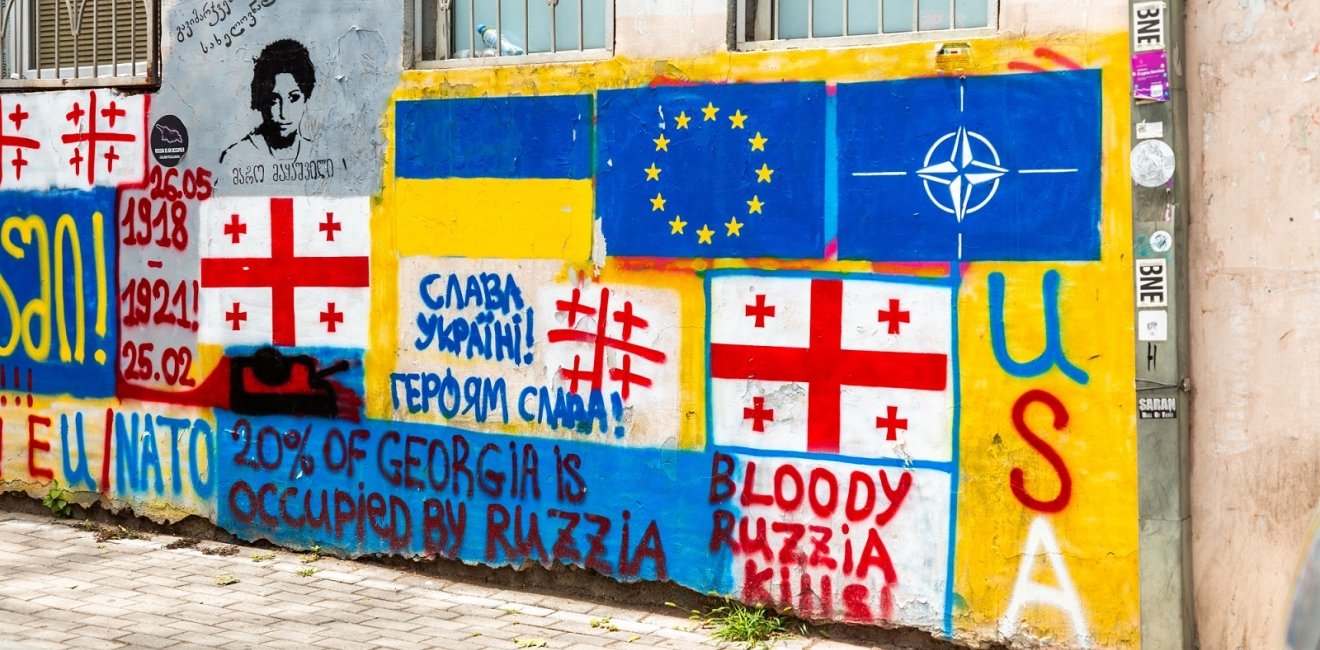
A blog of the Kennan Institute
Since 2022, Russian emigrants have found themselves caught between multiple pressures—judged by host societies, criticized by those who remained in Russia, and scrutinized by both other migrants and the broader Russian diaspora. Their experiences of emigration and integration, far from uniform, are often generalized and politicized, shaping public perception of the entire post-2022 exile community. As they navigate a complex geopolitical landscape, Russian exiles must move beyond insular cultural preservation and victim narratives and actively engage with their host societies. For Russians in exile, the challenge is not only personal survival or adaptation but also the responsibility of representing a future Russia—one that is democratic, self-reflective, and engaged with the world.
Russian emigrants face common challenges typical of other migrant communities, such as balancing integration with preserving family languages and traditions. But they also must navigate politically charged relationships with Ukrainian refugees and host countries, particularly in the former Soviet space. This pressure is especially intense for public figures and opposition leaders, who often overlook the need for a reflective approach toward their host societies. Building trust and credibility with these communities requires navigating complex histories, stereotypes, and myths—all of which remain largely unaddressed in the exile opposition’s discourse.
This issue extends beyond individual integration strategies and personal choices. It also concerns how opinion leaders, policymakers, NGOs in exile, and opposition figures among today’s Russian emigrants build institutional ties with and within their host societies. Unlike previous waves of Russian emigration or other refugee movements—Iranian or Syrian—this migration is unfolding in a uniquely complex geopolitical and historical landscape. This is particularly true in Eastern Europe and former Soviet republics, where standard frameworks for understanding migrant communities often fail to apply to Russians fleeing Putin’s regime.
Mixed Memories of the Soviet Era
This migration is unusual in its reversed nature, with Russians relocating to former Soviet republics and Eastern European countries undergoing their own post-colonial and post-communist transitions. These transitions often involve rediscovering their national histories and memories to distance themselves from the Soviet era, which is seen in countries like Estonia, Latvia, and Georgia as a period of occupation. National identities there are shaped by anti-colonial narratives, reflected in actions like dismantling Soviet monuments, opening "Soviet occupation" museums, renaming streets, and establishing new national holidays.
This dynamic remains largely unacknowledged by Russian opposition leaders and many individual Russians. It also puts these nations and societies in conflict with official narratives from Russia and Belarus, which use imperial and Soviet histories to justify current policies, including military aggression. And it puts the Russian exiles on the spot, because failing to recognize or respect the differing historical narratives of host countries, or adopting a defensive stance, often leads to accusations of "imperial arrogance" and reinforces associations with authoritarian attitudes, even among anti-war Russians.
In other words, the perspective from host societies, as seen on the streets of Tbilisi, suggests that merely distancing oneself from Russian authoritarianism in relation to the invasion of Ukraine is not enough. It is also essential to reflect on other harmful aspects of the regime that threaten human rights, freedoms, and lives.
Jokes like “Moscow on the Kura” in Tbilisi and “Moscow on the Spree” in Berlin highlight the perception that exiled Russians often recreate their familiar lifestyles without adapting to their new contexts. Historically, the Russian presence in these regions, especially in the former Soviet bloc, has been prominent, evoking specific memories and histories. Today, Russian-language activities, cultural events, and publishing ventures are thriving, but this visibility sometimes creates economic disparities and cultural friction. In cities like Tbilisi, Yerevan, and Berlin, issues like real estate instability exacerbate tensions, particularly when Russian-speaking enclaves become isolated, reinforcing divisions instead of fostering mutual understanding.
Elitist Emigrant Bubbles
Russian anti-war musicians, intellectuals, and opinion leaders touring cities that reach out to Russian audiences often alienate other anti-war migrants residing in the same host society. These events, marketed as uniting the diaspora, promote inclusion within an exclusive circle of "good Russians" (anti-war, anti-Putin), reinforcing a focus on Russian cultural practices while neglecting host community perspectives. This insularity fosters perceptions of elitism, reducing the credibility of these thought leaders and cultural figures outside the Russian-speaking bubble. The issue isn't about canceling cultural icons like Swan Lake but about adopting a socially responsible approach that engages with host societies inclusively, bridging divides and fostering broader connections.
Russian migrants would benefit from practical guidance, on subjects ranging from “politics in exile” or courses on integration that go beyond “learn the language and stay out of the trouble.” Failure to take active steps to smooth relations between Russian refugees as a group and their host communities only widens the gap between "Good Russians" and the rest.
Democratic-minded Russians must actively engage with their host societies, local stakeholders, and other exile communities to build trust and credibility. This goes beyond integration to include taking responsibility for fostering relationships at individual and communal levels. Russian exiles should broaden their agenda to address issues beyond their immediate circles in order to signal a commitment to shared values and collaboration.
Key steps include clearly articulating geopolitical positions, especially on issues linked to Russian authoritarianism beyond the war in Ukraine, and avoiding the formation of isolated "mini-Moscows" abroad. Leaders should promote integration by engaging with host societies through volunteering, participating in local events, and collaborating on community projects. Proactive efforts to build trust and work toward peace with other exile communities, including Ukrainian and Belarusian refugees, are essential. Additionally, the pro-democracy movement should amplify underrepresented voices, promote alternative historical narratives, and offer diverse perspectives to counterbalance Russia's historical dominance in intellectual discourse.
The international NGO Memorial has effectively promoted underrepresented histories of Soviet-era terror, setting an example for building trust by countering stereotypes and myths ingrained over decades. This requires more than statements; it demands visible actions and practices that decisively break from Russia's totalitarian past and align with European democratic values. Transparency, collaboration with European institutions, and support for alternative historical narratives can both strengthen this effort and counter Kremlin-backed revisionism. Learning from the experiences of exiles from other illiberal regimes, such as Iran, could further enrich these strategies. While diversity of opinion is central to democracy, Russian opposition groups must find common ground on key issues while accommodating differences on less critical matters.
Represent Future Russia
The path for pro-democracy Russians in exile to become credible and influential actors in the EU is a challenging one but achievable. It requires a clear understanding of this migration wave’s impact on host countries and a commitment from opposition leaders to build bridges with European stakeholders, other exile communities, and Ukrainian refugees. To prevent passing divisions to future generations, Russian exiles must move beyond a victim narrative for themselves, engage in dialogue, and demonstrate democratic values through concrete actions. Through consistent action and steadfast adherence to democratic norms, they will emerge as representatives and even leaders of a future democratic Russia.
A coherent political stance toward host societies should be developed with EU support, ensuring alignment on key geopolitical issues, shared European values, and a respectful approach toward societies affected by Russian policies. These principles, already consistently articulated by the Russian opposition, must also be translated into inclusive, socially responsible Russian-language projects and initiatives for Russians in exile. Ideally, they would be integrated into educational programs that foster dialogue on Soviet and Russian historical narratives while amplifying alternative and underrepresented histories.
The opinions expressed in this article are those solely of the author and do not reflect the views of the Kennan Institute.
Author


Kennan Institute
The Kennan Institute is the premier US center for advanced research on Eurasia and the oldest and largest regional program at the Woodrow Wilson International Center for Scholars. The Kennan Institute is committed to improving American understanding of Russia, Ukraine, Central Asia, the South Caucasus, and the surrounding region through research and exchange. Read more

Explore More in The Russia File
Browse The Russia File
Chechnya as a Model of Modern Russia

Russia’s Indigenous Communities and the War in Ukraine

Gas and Power in a Changing US–Russia Relationship

